- Home
- Allison Brennan
Shattered
Shattered Read online
Begin Reading
Table of Contents
About the Author
Copyright Page
Thank you for buying this
St. Martin’s Press ebook.
To receive special offers, bonus content,
and info on new releases and other great reads,
sign up for our newsletters.
Or visit us online at
us.macmillan.com/newslettersignup
For email updates on the author, click here.
The author and publisher have provided this e-book to you for your personal use only. You may not make this e-book publicly available in any way. Copyright infringement is against the law. If you believe the copy of this e-book you are reading infringes on the author’s copyright, please notify the publisher at: us.macmillanusa.com/piracy.
More than thirty books ago, Marti Robb (known to readers as Mariah Stewart) read and endorsed my first book. Thank you so much for being a mentor and a friend.
Acknowledgments
My fellow writers are generous souls, many of whom are experts in areas other than spinning tales. In particular, I want to shout out to Dr. D. P. Lyle, who has been a blessing. He never blinks an eye when I shoot him an e-mail beginning, “So I have this dead body…” Once again, Doug has been instrumental in helping me with the small details. Any mistakes are on me.
Legally, there’s no one better than former prosecutor Allison Leotta, who always responds so quickly when I have a question about the justice system. This time, she really saved my butt. Thank you!
I needed some details about prisoners, bail, and the Maricopa County legal system. Thank you to Sergeant Patrick Regan with the Scottsdale Police Department for answering my questions. Apologies if I got anything wrong!
My editor, Kelley Ragland, always has a keen eye for problems in my books; with Shattered she saw the potential and with one eye-opening comment helped me see the solution. A good editor is worth her weight in gold; thank you, Kelley! And thanks once again to my agent, Dan Conaway, who always has my back.
As always, my family is my rock. They let me work when I have to and make me play when I need it. I love you all.
Prologue
She sat on the edge of her son’s bed, clutching his favorite stuffed toy. A dog. Matthew had wanted a puppy for years. She’d convinced her husband that they should get a puppy for Christmas.
But their son would never see another Christmas.
She didn’t know how long she sat there, but it was dark when her husband came into the room.
“Please, honey, come to bed.”
She stared at the man she had once loved. The man who had fathered her only child. The face she had admired, the smile that made her heart flutter, now made her physically ill. She hated him. She had never hated anyone more than the man she had sworn to love, honor, and cherish. The man she had promised to be faithful to, the man she had promised to stand by in everything life threw at them.
She could barely speak, but she said, “You should have been here.”
“Don’t—please don’t.”
Tears flowed, but they didn’t soften her heart. Tears of rage were so very different from tears of grief.
“I can’t look at you. I can’t live with you. It’s your fault our son is gone!”
“You don’t mean that. Please, I’m sorry. I’ll say it as many times—”
“It’ll never be enough! Sorry doesn’t bring Matthew back!”
“I know you’re hurting, honey. I’m hurting, too.” His eyes wandered to the wall of photos. Of Matthew growing up. Baby. Toddler. Kindergarten. And the last photo, second grade. His last school picture.
His voice cracked. “Stay with your mom for a few days. Until—”
“I’m not coming back.”
He reached for her. “I know you’re hurt, but we can survive this together.”
She jumped up before he could touch her. She didn’t know what she’d do if he put his hands on her … if he tried to console her.
She might kill him.
Death would be too good for him. He should suffer for the rest of his life. Suffer because he wasn’t here. Suffer because he had lied, he had cheated, he was a selfish, disgusting excuse for a human being. How had she loved him? Why hadn’t she seen the truth before it was too late?
She ran to the door of Matthew’s room. The anger and hate bubbled up and overshadowed the deep, numbing pain.
She had never realized how much it would hurt to lose her only child, but if she dwelled on it, let the pain in, she would drown in her grief. Instead, she focused on the reasons Matthew had died. The anger that would keep her breathing.
“I hope you suffer for the rest of your miserable life. I hope you know that because of you, my son is dead.”
Through the sobs that shook her husband’s body, he said, “He’s our son. Please—don’t. Don’t do this to me. To us.”
“I hate you.” Those three words changed everything. There was no going back.
She walked out without another word, without looking at her husband, leaving him sobbing in the middle of their dead son’s room.
She hoped he suffered twice as much as she did.
I hate you.
She should have been speaking to a mirror.
Chapter One
WEDNESDAY
Maxine Revere, investigative reporter, learned the hard way that insinuating herself into the middle of an active police investigation was a recipe for disaster, which is why she focused primarily on missing persons and cold cases. Law enforcement was usually willing to talk when the case was dead in the water. Unsolved cases grated on the nerves of most cops. If Max used her extensive financial resources and media access to gather actionable information, cops would often work with her.
Worse than shaking things up in the middle of an investigation was showing up right before a trial. The bad guy was behind bars, the powers that be were a 1,000 percent positive they had the right person, and Max’s involvement caused the chief of police, district attorney, and prosecutor to lose sleep. She didn’t much care—if they were confident with their evidence, there was nothing to lose sleep over.
But Max rarely did anything the easy way, so when her old college friend—okay, old college ex-boyfriend—called her weeks before his wife was to go on trial for the murder of their only child, desperately believing that she was innocent, Max agreed to fly to Scottsdale, Arizona, to listen to John’s theory which—she had to admit—sounded intriguing over the phone.
Still, in Max’s experience, while occasionally the wrong person was accused and imprisoned, the prosecution rarely went forward with a costly trial when they didn’t have ample evidence for a conviction. Not only because of the cost, but politics. A high-profile case such as a wealthy mother killing her eight-year-old son? Everyone was under a microscope from the beginning. With such scrutiny, the DA wouldn’t let it go this far without something solid to sway a jury. So even though it was John Caldwell—a man Max respected and even admired—asking for her help, she needed more than his faith in his wife’s innocence.
It was the cold cases that had her flying from New York to Phoenix. Three cold cases in the southwest that were eerily similar to the murder of Peter Caldwell.
* * *
Max had interviewed many defendants and witnesses during her decade-long career as an investigative journalist. Most of the lawyers she dealt with either wanted nothing to do with her or attempted to manipulate her into printing only information favorable to their client.
She didn’t know what to expect from Charles North, the respected criminal defense lawyer who represented Blair Caldwell. But a condition of her interview with Blair was that she would first meet with North, where he would “lay down the rule
s.”
Max always enjoyed these conversations.
Boxer, North, and Associates had the top floor of a high-rise in downtown Phoenix, boasting views of Chase Field. As Max waited for North in the lobby—decorated in subdued desert hues—she wondered why Blair asked that the interview be conducted in her attorney’s office. Blair had expressly said she hadn’t wanted Max to come to her house. Originally, she’d planned to meet with the Caldwells yesterday, but instead John came alone to the Biltmore, where Max was staying, and gave her what she considered a lame excuse for Blair’s absence. They’d talked for several hours, and the anguish in John’s voice was clear.
His son’s death had gutted him and John was desperate to protect his wife. She was innocent, the result of a legal system gone awry, according to John.
“Blair couldn’t kill anyone, let alone our son. But the police couldn’t find a suspect, they twisted everything around, and arrested Blair. They have no evidence. None.”
Max had reminded John multiple times—because he didn’t seem to absorb her meaning—that she would give him the truth, but that maybe a private investigator would be more appropriate than an investigative reporter.
“Blair’s attorney has a private investigator on staff,” John had said. “They don’t care who killed Peter. They only want to prove it wasn’t Blair.”
John was correct, but Max had explained—twice—that she didn’t work active homicide investigations. Cold cases were different because—usually—the crime was more than a year old and the police didn’t have a suspect. The only time she stepped into a hot case was a missing person because a media spotlight could often be helpful.
John was convinced that if Max solved the three cold cases that were similar to Peter’s murder, that she would de facto solve Peter’s murder. Max thought he was stretching. Yet here she was, waiting to talk to Blair and her attorney. John was one of Max’s few close friends. How could she say no? How could she turn her back on a friend when she didn’t have many to spare?
Besides, the three cold cases were more than a little intriguing. Peter Caldwell aside, if her staff had presented her with the cases as a possible investigation for her monthly crime show, Maximum Exposure, she would have seriously considered them.
Her phone rang and she almost sent it to voice mail, but it was a call she’d been expecting. She stepped away from the receptionist and answered.
“Counselor,” she said, her voice warm and smooth, “I’ve been expecting your call.”
“You threatened me, and I’ve had enough.”
She went from cordial to heated in a heartbeat. “I didn’t threaten you, Mr. Stanton. I gave you a courtesy call.”
“Courtesy? That’s what you call exploiting my son’s murder?”
She went from heated to angry in the next heartbeat.
“I said I didn’t need your permission, but I want your help.” Her voice was even but sharp. “You’re the one who has been avoiding my calls.”
“Let me explain something to you, Ms. Revere,” Stanton said. “Without me, you have nothing. No one will speak to you. You step out of line, you will be arrested. My son is off-limits. Are we clear?”
“Your son’s murder is unsolved, and I believe I can solve it.” Why did she say that? She’d never solved a murder nearly twenty years cold. It was next to impossible.
But she was angry, so she didn’t backtrack—not that she would have. Showing doubt, showing weakness, wouldn’t get her what she needed.
“Do you think I haven’t used every legal resource at my disposal to solve Justin’s murder? He was my son, I’m the district attorney, and I have never forgotten.”
Max dialed back her anger. Just a bit. “My track record speaks for itself, Mr. Stanton. I have connected Justin’s murder with two, possibly three similar crimes, but I need more information. Meet with me. Please,” she added, “I’ll explain my theory and share everything I have learned.” Which was very little at this point. “If after we meet you are still adamant about not helping, I’ll respect that.”
“And back down?”
“Of course not,” she said. Obviously the San Diego District Attorney didn’t know her reputation. “I’ll still investigate. I simply won’t include you. I’ll fly to Idaho and speak with your ex-wife.”
“Leave Nelia out of this.” She could hear the venom in his voice. Score one for her—she knew how to ensure his cooperation.
“Justin was her son, too.”
“Blackmail now?”
“Really, that’s what you’re going with? Blackmail.” Max was trying to give Andrew Stanton some leeway because he had lost his son, but the lawyer was making it difficult for her to play nice.
“Nelia has been through hell, I won’t allow you—”
“Stop,” Max said. She spotted who she presumed to be North’s assistant standing by the reception desk looking at her. “You have my producer’s phone number. Call him. He’ll answer your questions and you can feel free to browbeat and threaten him over the phone. Ben lives for conflict. But I will be in San Diego tomorrow afternoon. Either you work with me or you don’t, but you’re not going to stop me.”
She ended the call and took a long, deep breath. She needed to regain her composure if she was going to be on her A game with Blair Caldwell.
Max was digging a deep hole for herself. The four cases—Peter Caldwell’s murder and the three others—had many similarities, but similarities didn’t solve crimes. She’d been pulling together research for the last two weeks, and she still had very little to go on. The police had connected none of the four cases, and proving they were linked would be impossible if she couldn’t access police records and forensics reports. The first two homicides were unsolved; in the third the father was in prison; and the last—Peter—was built on circumstantial evidence.
She and her staff were working several threads, but so far nothing she pulled led anywhere. Max could neither prove—nor disprove—a connection. She needed to be in the field, talking to people who had been there, reading the files, analyzing the data, reinterviewing witnesses and suspects. And even then, she had never tackled an assignment of this magnitude.
Yet, you tell Stanton that you can solve his son’s murder.
She had put her reputation on the line with one angry comment. That deep hole she saw herself standing next to had just gotten a whole lot wider.
“Ms. Revere?” The young man who had been standing at the reception desk walked over to her. “I’m Ron Lee. Mr. North is ready for you.”
“Thank you,” she said formally and pulled herself together. She didn’t know why this investigation had gotten under her skin. She prided herself on maintaining a level of detachment from the victims, the surviving family, and law enforcement. But lately, she’d found herself more wrapped up in the lives of the people involved in an investigation than she was comfortable with. She couldn’t seem to find the personal detachment that had served her well for so long.
Max followed Ron down the wide hallway, which turned before reaching double doors with CHARLES NORTH engraved on a gold plaque. The assistant knocked, waited for permission to enter, then grandly opened both doors.
“Ms. Maxine Revere,” Ron announced formally.
North rose from his desk and crossed the large corner office. Blair wasn’t in the room.
He took her hand. “Ms. Revere, I’m Charles North. We spoke on the phone.” He turned to his assistant. “Ron, please sit with Mrs. Caldwell until I need her.”
“Yes, sir.” Ron closed the doors on his way out.
North motioned for Max to sit at a conference table that could comfortably sit twelve. He sat at the head. Common tactic. Max smiled and took a seat two down from him. “Thank you for arranging this meeting.”
“As I told you last week,” North said, “I disapprove of Mr. Caldwell’s investigation and his ill-conceived theory. He is a man grasping at straws who doesn’t understand the legal system and the primary goal of my team. Our
goal is for the jury to return a not guilty verdict. We believe that the State will not be able to prove their case against my client.”
As with many lawyers who Max had met over the years, North spoke clearly and formally.
“You indicated during our earlier conversation that the prosecution lacked evidence, but you were not specific.”
“I will not outline our legal strategy to the media prior to trial. As I also said over the phone, I would consent to an interview after the trial is concluded. It is my understanding that you will be covering the trial for NET?”
It was worded as a question, because Max hadn’t actually said anything about media involvement in Blair’s trial.
“NET will be covering the trial.”
“But not you?”
“Either myself or Ace Burley, NET’s crime reporter.” She didn’t want to cover the trial, but she was already out here. She might be stuck with it. NET gave her a lot of leeway to run her show and her investigations as she wanted—a condition of her agreeing to host Maximum Exposure in the first place. So when they asked for something—like coverage of a trial—she generally agreed. It was her least favorite aspect of her job.
“Then what is your interest in this case? Other than the fact that you’re John Caldwell’s ex-girlfriend.”
Had John or Blair told the lawyer about her relationship with John? She hadn’t expected the information to be kept secret, but she certainly hadn’t intended to lead with the fact that she’d dated John for a year while they were both at Columbia University.
Max leaned back in the leather chair. “Mr. North, Blair already agreed to talk to me. Please bring her in.”
“I advised Mrs. Caldwell not to speak with you. She overruled me, but be aware that she is only doing this for her husband. I ask that you consider that before using anything she says.”
Max already suspected that Blair agreed to talk to her because John wanted it. She said, “Over the past decade, I have covered dozens of trials, investigated hundreds of cold cases, and interviewed thousands of witnesses, victims, suspects, and family members.”

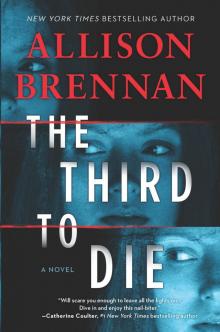 The Third to Die
The Third to Die Nothing to Hide
Nothing to Hide No Way Out
No Way Out Cold as Ice
Cold as Ice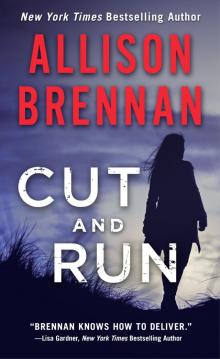 Cut and Run
Cut and Run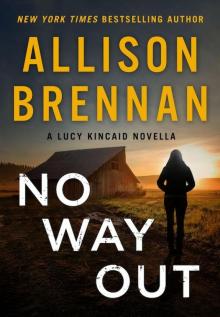 No Way Out (Lucy Kincaid Novels)
No Way Out (Lucy Kincaid Novels) Storm Warning
Storm Warning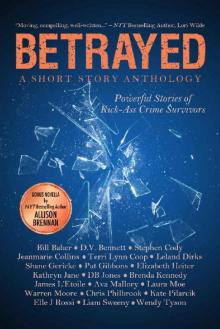 Betrayed: Powerful Stories of Kick-Ass Crime Survivors
Betrayed: Powerful Stories of Kick-Ass Crime Survivors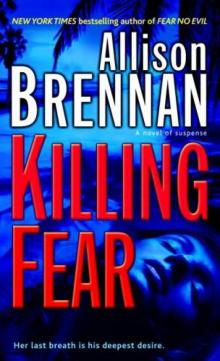 Killing Fear pb-1
Killing Fear pb-1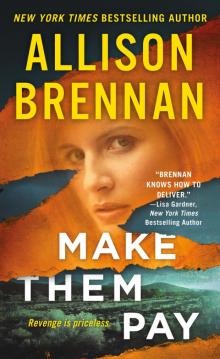 Make Them Pay
Make Them Pay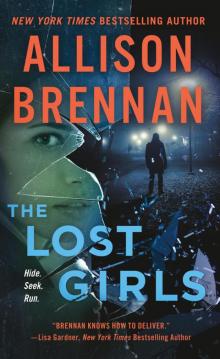 The Lost Girls
The Lost Girls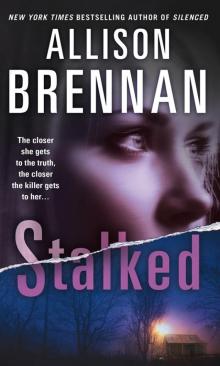 Stalked
Stalked Killing Justice
Killing Justice A Deeper Fear
A Deeper Fear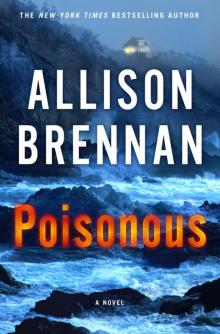 Poisonous
Poisonous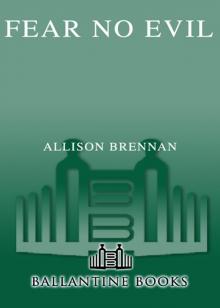 Fear No Evil
Fear No Evil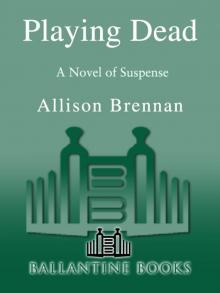 Playing Dead
Playing Dead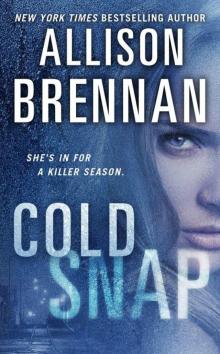 Cold Snap
Cold Snap Vacation Interrupted
Vacation Interrupted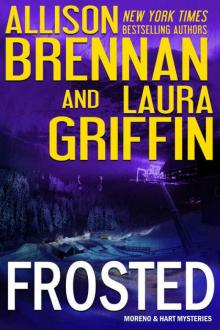 Frosted (Moreno & Hart Mysteries)
Frosted (Moreno & Hart Mysteries)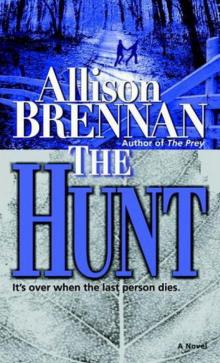 2 - The Hunt
2 - The Hunt Stolen
Stolen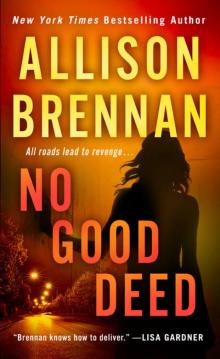 No Good Deed
No Good Deed Cutting Edge
Cutting Edge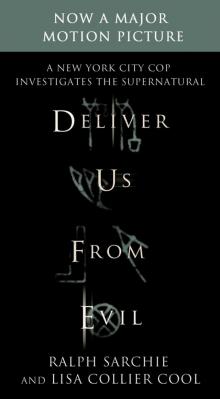 Deliver Us from Evil
Deliver Us from Evil If I Should Die
If I Should Die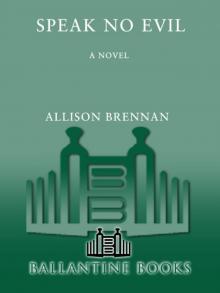 Speak No Evil
Speak No Evil Silenced lk-4
Silenced lk-4 Original Sin sds-1
Original Sin sds-1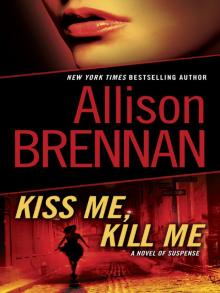 Kiss Me, Kill Me lk-2
Kiss Me, Kill Me lk-2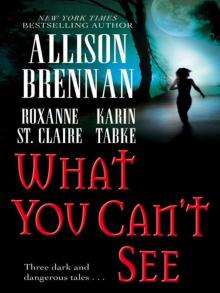 What You Can’t See
What You Can’t See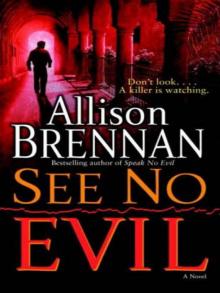 See No Evil
See No Evil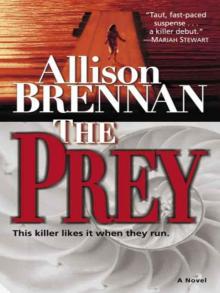 The Prey
The Prey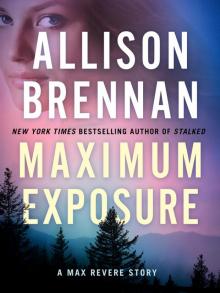 Maximum Exposure
Maximum Exposure Fatal Secrets f-2
Fatal Secrets f-2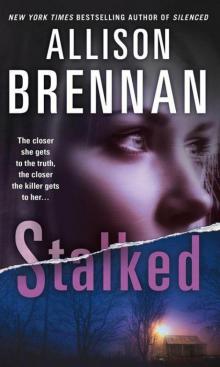 Stalked lk-5
Stalked lk-5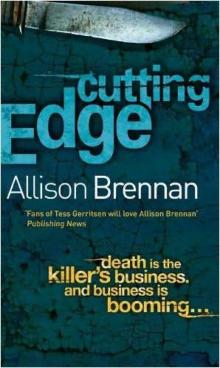 Cutting Edge f-3
Cutting Edge f-3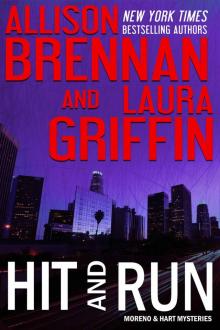 Hit and Run (Moreno & Hart Mysteries)
Hit and Run (Moreno & Hart Mysteries)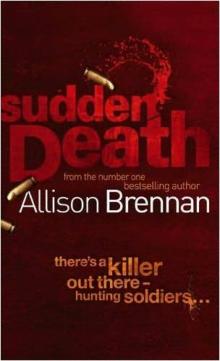 Sudden Death f-1
Sudden Death f-1 If I Should Die lk-3
If I Should Die lk-3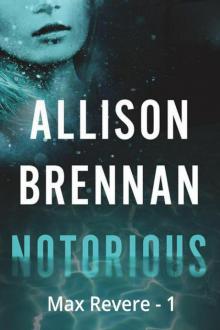 Notorious
Notorious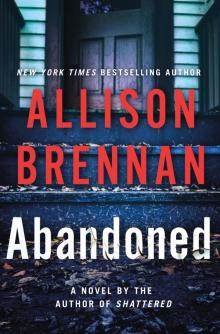 Abandoned
Abandoned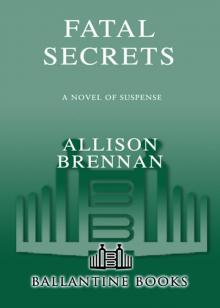 Fatal Secrets
Fatal Secrets The Hunt
The Hunt Carnal Sin sds-2
Carnal Sin sds-2 Love Is Murder
Love Is Murder Lost and Found
Lost and Found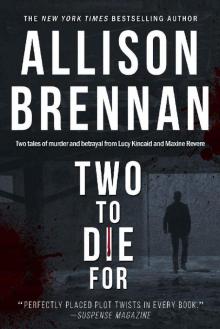 TWO TO DIE FOR
TWO TO DIE FOR Breaking Point
Breaking Point Best Laid Plans
Best Laid Plans Carnal Sin
Carnal Sin Silenced
Silenced Dead Heat
Dead Heat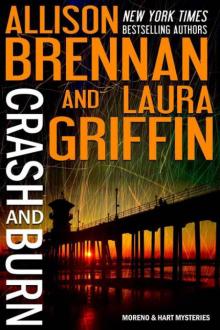 Crash and Burn
Crash and Burn Sudden Death
Sudden Death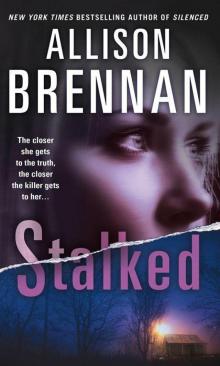 Lucy - 05 - Stalked
Lucy - 05 - Stalked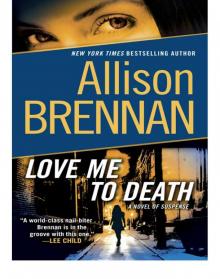 Mortal Sin
Mortal Sin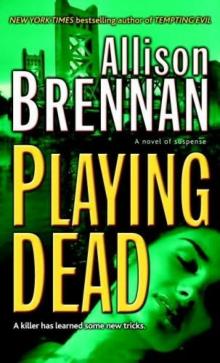 Playing Dead pb-3
Playing Dead pb-3 Kiss Me, Kill Me
Kiss Me, Kill Me Original Sin: The Seven Deadly Sins
Original Sin: The Seven Deadly Sins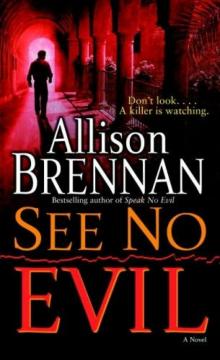 See No Evil e-2
See No Evil e-2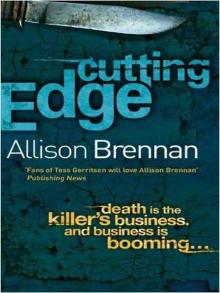 Cutting Edge: A Novel of Suspense
Cutting Edge: A Novel of Suspense Original Sin
Original Sin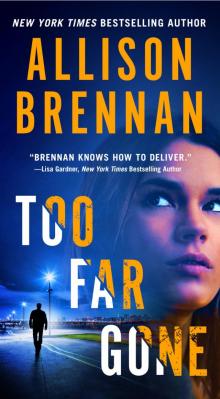 Too Far Gone
Too Far Gone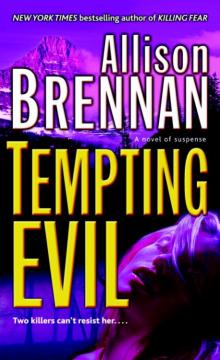 Tempting Evil
Tempting Evil Shattered
Shattered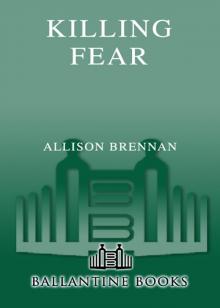 Killing Fear
Killing Fear Murder in the River City
Murder in the River City Love Is Murder (lucy kincaid)
Love Is Murder (lucy kincaid)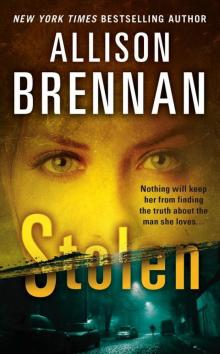 Stolen (Lucy Kincaid Novels)
Stolen (Lucy Kincaid Novels)